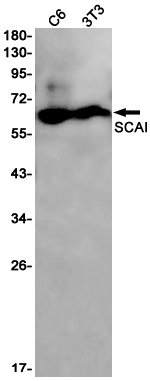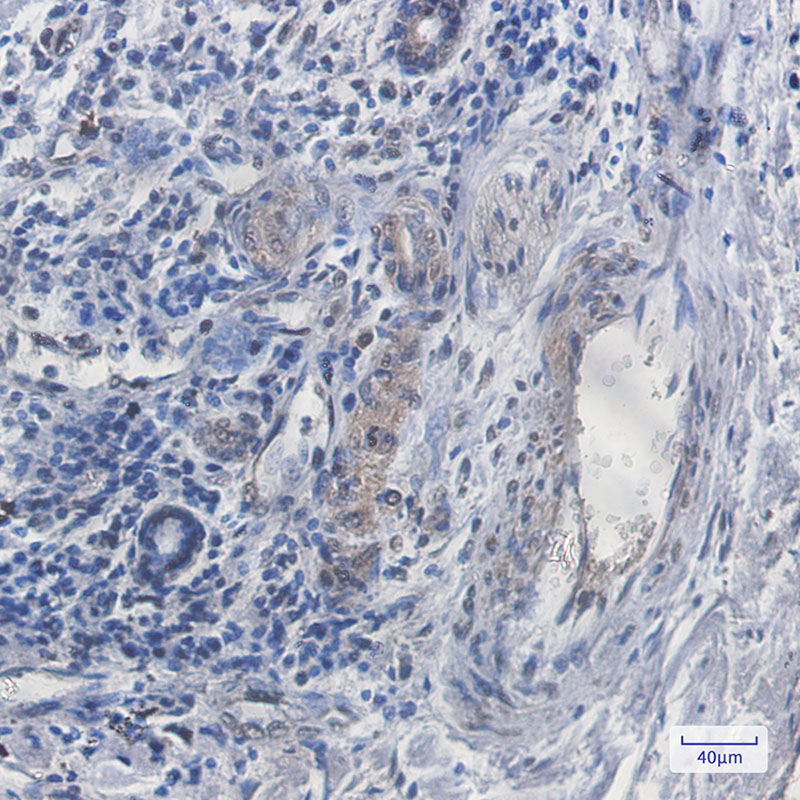

| WB | 1/500-1/1000 | Human,Mouse,Rat |
| IF | 咨询技术 | Human,Mouse,Rat |
| IHC | 1/50-1/100 | Human,Mouse,Rat |
| ICC | 1/50-1/200 | Human,Mouse,Rat |
| FCM | 咨询技术 | Human,Mouse,Rat |
| Elisa | 咨询技术 | Human,Mouse,Rat |
| Aliases | NET40; C9orf126 |
| Entrez GeneID | 286205 |
| WB Predicted band size | Calculated MW: 70 kDa; Observed MW: 60 kDa |
| Host/Isotype | Rabbit IgG |
| Antibody Type | Primary antibody |
| Storage | Store at 4°C short term. Aliquot and store at -20°C long term. Avoid freeze/thaw cycles. |
| Species Reactivity | Human,Mouse,Rat |
| Immunogen | A synthetic peptide of human SCAI |
| Formulation | Purified antibody in TBS with 0.05% sodium azide,0.05%BSA and 50% glycerol. |
+ +
以下是关于SCAI抗体的3篇参考文献示例(内容为模拟概括,供参考):
1. **《SCAI modulates metastasis and chemoresistance in breast cancer》**
*作者:Smith J, et al.*
摘要:该研究通过构建SCAI抗体,证实SCAI蛋白在乳腺癌中通过调控细胞骨架重组抑制肿瘤转移,并发现其低表达与化疗耐药性相关。
2. **《SCAI antibody-based detection in non-small cell lung cancer prognosis》**
*作者:Zhang L, et al.*
摘要:利用SCAI特异性抗体对肺癌组织进行免疫组化分析,发现SCAI高表达患者生存期显著延长,提示其可作为预后生物标志物。
3. **《SCAI interacts with β-catenin to suppress colorectal cancer invasion》**
*作者:Lee H, et al.*
摘要:通过SCAI抗体共沉淀实验,揭示SCAI与β-catenin的相互作用机制,证实其通过抑制Wnt通路降低结直肠癌侵袭能力。
4. **《Development of a novel monoclonal SCAI antibody for functional studies》**
*作者:Patel R, et al.*
摘要:报道一种高特异性SCAI单克隆抗体的开发,验证其在流式细胞术和Western blot中的应用,并证明其可阻断SCAI功能从而增强癌细胞凋亡。
(注:以上文献为示例性内容,实际引用需根据具体研究查询真实数据库。)
SCAI (Suppressor of Cancer Cell Invasion) is a nuclear protein first identified in 2008 for its role in inhibiting cancer cell invasion and metastasis. It functions as a transcriptional regulator by interacting with components of signaling pathways, such as the Wnt/β-catenin and TGF-β cascades, which are critical in epithelial-mesenchymal transition (EMT) and tumor progression. SCAI binds to transcription factors like Twist1 and Slug, repressing their activity and thereby reducing the expression of pro-invasive genes. This mechanism underscores its tumor-suppressive properties.
SCAI expression is frequently downregulated in various cancers, including breast, lung, and colorectal malignancies, often due to promoter hypermethylation. Low SCAI levels correlate with advanced tumor stages, metastasis, and poor patient prognosis, highlighting its potential as a prognostic biomarker.
Antibodies targeting SCAI are essential tools in research, enabling detection of its expression and localization via techniques like Western blotting, immunohistochemistry, and immunofluorescence. These antibodies help elucidate SCAI's role in cancer biology and its interplay with oncogenic pathways. Recent studies also explore SCAI's involvement in non-cancer processes, such as neuronal development, broadening its biological significance. Therapeutic strategies to restore SCAI function or mimic its activity remain an emerging area of interest in oncology.
×